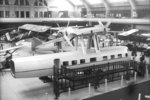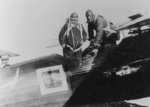![Bre.19 file photo [15980] Bre.19 file photo [15980]](/images/air_bre19_1.jpg)
Bre.19
| Country | France |
| Manufacturer | Société des Ateliers d'Aviation Louis Bréguet |
| Primary Role | Light Bomber |
Contributor: Alan Chanter
ww2dbaseAlmost certainly built in larger numbers than any other warplane type in the period between the world wars, the Bre.19 was designed as a successor to the Bre.14 that had performed so magnificently in World War I. A two seat biplane that employed a substantial amount of aluminium alloy in its structure, the Bre.19 demonstrated the measure of progress that had been made in aircraft development since the end of the war (it weighed the same as it Breguet predecessor but could carry a payload that was up to 80 per cent greater). The Bre.19 was developed to be either an observation and reconnaissance aircraft (in its A.2 version) or a day bomber (in its B.2 version). The prototype, which first appeared in public at the Paris Salon de l’Aéronautique, was initially fitted with the experimental Brequet-Bugatti 16-cylinder engine, but was subsequently fitted with the 450-hp Renault 12Kb 12 cylinder Vee with which the type made its maiden flight in March 1922.
ww2dbaseProduction commenced in 1923 and by 1927 some 2,000 Bre.19s (equally divided between the A.2 and B.2 version) had been delivered to the French Air Force. A number of these saw active service against rebel Druze tribesmen in Syria and Riff insurgents in Morocco.
ww2dbaseThe Breguet Company were excellent publicists and embarked on an aggressive export campaign, demonstrating, in 1923, their Bre.19 prototype at an international competition organised by the Spanish War Ministry. This led to an order from Yugoslavia for 400 aircraft (and later a license to build the type in Yugoslavia). Many of these aircraft were still in service when the Germans invaded in 1941 but saw only limited action, most being destroyed on the ground. The few that survived were subsequently handed over to the puppet Croat regime for use against partisan fighters.
ww2dbaseSpain purchased 19 aircraft and the CASA Company assembled 26 more from French components before obtaining a license to build 177 of their own. The Spanish Bre.19s saw action against rebels in Morocco and by the start of the Civil War in 1936 some 135 were still, though almost obsolete, on strength. These aircraft were used by both sides during the war largely against troop concentrations and ground targets and also for coastal patrols.
ww2dbaseOther foreign purchasers included Romania, Poland, Argentina, Venezuela, Bolivia, Brazil and China, while licensed production was undertaken in Turkey, Belgium, Yugoslavia, and Greece. The British, Italian and Persian governments all purchased examples for evaluation as did Japan who planned to have the type manufactured by the Nakajima company (although this plan was ultimately abandoned). The Bolivian Bre.19s saw action during the Chaco War with Paraguay (1928-1935) for control of the inhospitable Chaco region of South America.
ww2dbaseTo prove what an effective combat aircraft it was, the Breguet Company ensured that the Bre.19 remained in the headlines throughout the 1920s and 1930s with a series of world distance record attempts, mostly using their Grand Reid (GR) version fitted with auxiliary fuel tanks and powered by a Lorraine-Dietrich12Db engine.
ww2dbaseEven though the French Air Force had replaced the Breguet Bre.19 with more modern aircraft by the late 1930s, it still saw combat with the Chinese, who used the type against the Japanese in Manchuria, and with the Greek Air Force against invading Italians in October 1940.
ww2dbaseThe Bre.19 was built using a variety of engines in the power range between 400 and 860hp dependant on customer requirements. The most commonly used were the Lorraine 12Ed in-line engine rated at 450hp or the Renault 12kb 12 cylinder vee rated at 513hp.
ww2dbaseSources:
Francis Crosby, The World Encyclopedia of Bombers (Hermes House, 2004)
Chris Chant, Aircraft of World War II (Dempsey Parr, 1999)
World Aircraft Information Files (Bright Star Publishing)
Last Major Revision: Sep 2012
SPECIFICATIONS
Bre.19
| Machinery | One Lorraine 12Ed in-line engine rated at 450 hp or one Renault 12kb 12-cyl V-engine rated at 513hp |
| Armament | 1x 7.7mm or 7.5mm forward machine gun, 1x or 2x 7.7mm or 7.5mm rear machine gun, optional 1x 7.7mm or 7.5mm ventral machine gun, up to 700kg of bombs |
| Crew | 2 |
| Span | 14.83 m |
| Length | 9.61 m |
| Height | 3.69 m |
| Wing Area | 50.00 m² |
| Weight, Empty | 1,387 kg |
| Weight, Maximum | 2,500 kg |
| Speed, Maximum | 214 km/h |
| Service Ceiling | 6,900 m |
| Range, Normal | 800 km |
Photographs
 |  |  |  |
Please consider supporting us on Patreon. Even $1 per month will go a long way! Thank you. Please help us spread the word: Stay updated with WW2DB: |
- » Race, Holocaust, and African-American WW2 Histories Removed from the US Naval Academy Library (7 Apr 2025)
- » US Government Plans to Purge WW2 Information (17 Mar 2025)
- » WW2DB's 20th Anniversary (29 Dec 2024)
- » See all news
- » 1,167 biographies
- » 337 events
- » 44,601 timeline entries
- » 1,243 ships
- » 350 aircraft models
- » 207 vehicle models
- » 376 weapon models
- » 123 historical documents
- » 261 facilities
- » 470 book reviews
- » 28,505 photos
- » 366 maps
Winston Churchill
Please consider supporting us on Patreon. Even $1 a month will go a long way. Thank you!
Or, please support us by purchasing some WW2DB merchandise at TeeSpring, Thank you!